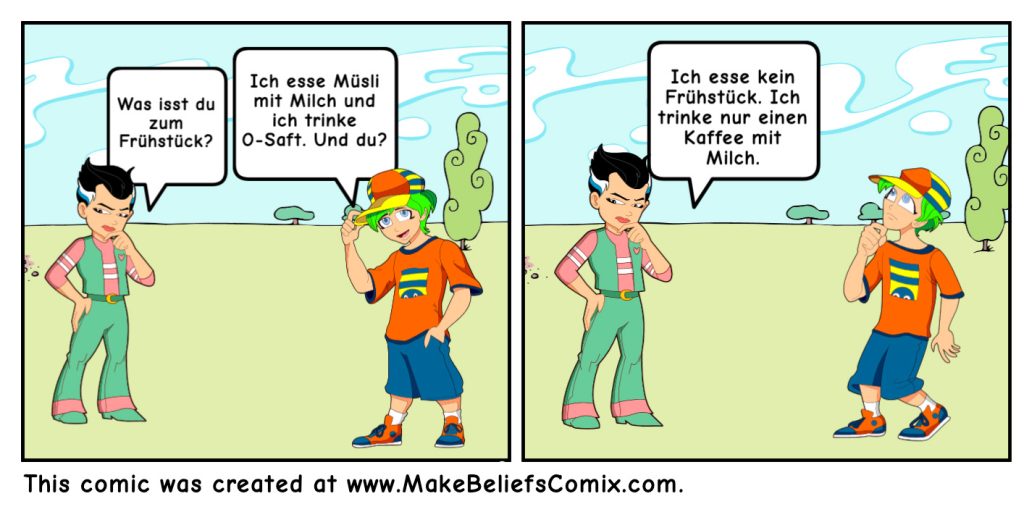6.5 Das ist ein schönes Frühstück!

Guten Morgen!
Zum Aufwärmen machen wir unseren Tagesminiplausch und eine Wiederholung.
Wiederholung
In the previous lesson, you learned about Getränke. Let’s review what you have learned.
Open your written journal and write these headings over three columns: Ich trinke gern… and Ich trinke nicht gern… and Ich trinke kein/keine/keinen… Then write down in German as many beverages as you can remember in the columns. When you are done, check the previous activity to ensure you have written down all of the beverages.
When you are done, record your lists. Start each list with the respective heading. Be sure to practice before your record or re-record, if your recording does not sounds fluid.
Lektionsüberblick
Das ist ein schönes Frühstück! literally means “That’s a lovely breakfast”, but would be said sarcastically, if you’re day is off to a bad start. In this lesson, we will talk about what makes for a schönes Frühstück in Germany (but without the sarcastic tone). In the end of this lesson, you will be able to 1) recognize words for breakfast foods and 2) list what you typically eat for breakfast.
1) das Frühstück (Breakfast)
Was isst du zum Frühstück? What do you eat for breakfast? Isst du herzhaft oder süß? Do you eat something savory or sweet? We’ll start by looking at the various kinds of breakfast foods in Germany and other German-speaking countries, as well as in the US. Listen to and read along with the slides. Be sure to click through to the end.
Jetzt bist du dran!
Now record this in German in your audio journal. If you can do it immediately without reading, that’s great! Otherwise, practice saying it a couple times before recording. Or rerecord, if you are not satisfied.
Hamburg im Blickpunkt

Hamburg hat fast 2.500 Brücken, die die zahlreichen Fleete, Flüsschen und Kanäle der Stadt überspannen. Damit hat sie mehr Brücken als Venedig (398) und Amsterdam (1.300). 20 der 2.500 Hamburger Brücken sind in der Hamburger Speicherstadt, der weltgrößte historische Lagerhauskomplex. Seit 1991 steht die Speicherstadt unter Denkmalschutz. Die Speicherstadt liegt in einem Gebiet, das bei einer Sturmflut vom Elbwasser überflutet werden kann, wodurch sich der untere Boden nicht zum Lagern eignet und nur zu Versandvorbereitungen dient. Heute beträgt die Nutzfläche der Speicherstadt etwa 630.000 Quadratmeter und beherbergt neben zahlreichen Teppichhändlern und Agenturen diverse Museen, wie das Speicherstadtmuseum, das Zollmuseum und das Gewürzmuseum. Auch die größte Modelleisenbahnanlage der Welt, das Miniatur Wunderland, ist seit 2000 hier untergebracht.
Hamburg has almost 2,500 bridges, which span the city’s numerous canals, small rivers, and waterways. The city has more bridges than Venice (398) and Amsterdam (1,300). 20 of Hamburg’s 2,500 bridges are in the Speicherstadt (literally City of Warehouses), the largest warehouse district in the world. The Speicherstadt has been a protected historical monument since 1991. Located in an area prone to flooding during storm surges, the lower levels are unsuitable for storage and are used only for shipping preparation. Today, the Speicherstadt has a usable area of approximately 630,000 square meters and houses numerous carpet dealers and agencies, as well as various museums, such as the Speicherstadt Museum, the Customs Museum, and the Spice Museum. Miniatur Wunderland, the world’s largest model railway, has also been located here since 2000.
2) Was ich zum Frühstück esse
Listen along as you read the comic. Do you understand what they are saying?

Let’s practice!
Kleiner Hinweis
Do you observe religious food restrictions? Then you might need one of these sentences:
- Ich esse nur koscher.
- Ich esse nur halal.
Jetzt bist du dran!
Zum Schluß

*As you conclude this lesson, don’t forget to check Canvas!*
Here are some videos featuring interviews with Germans talking about their breakfast habits.

Media Attributions
- 1010-1020 banner long large reduced
- 6.5 was isst du zum fruehstueck make-beliefs-comix © This comic strip was generated at http://www.MakeBeliefsComix.com. Used by permission of author and site creator Bill Zimmerman.
- Private: confidence scale_large horizontal_updated

